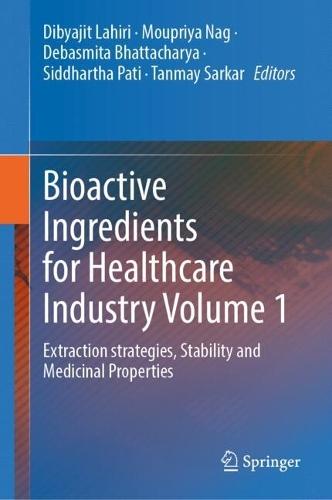Overview
Bioactive compounds obtained from natural sources has proven to possess various therapeutic potentials. Although they have proven its therapeutic efficacy for ages but a major limitation is difficulty in the extraction of single compound from its mixture. The volume 1 of the book is an important step to help the readers understand about the principles and practices associated with the extraction, stabilization and therapeutic applications of various bioactive compounds obtained from natural sources. The book provides information on various innovative techniques those are involved in the extraction processes i.e. from the conventional strategy of extraction to advanced technologies. Stability of bioactive compounds are also an important factor. Thus this book also focuses on this issue by highlighting various strategies comprising of freeze-drying, encapsulation and nanotechnology. This volume will focus on antimicrobial, antioxidant, anti-inflammatory and various other therapeutic properties of the compounds and their applications as cosmetics, nutraceuticals and pharmaceuticals. Thus this book would have a comprehensive know-how of bioactives from extraction to application.
Full Product Details
Author: Dibyajit Lahiri ,
Moupriya Nag ,
Debasmita Bhattacharya ,
Siddhartha Pati
Publisher: Springer Nature Switzerland AG
Imprint: Springer Nature Switzerland AG
ISBN: 9789819636624
ISBN 10: 9819636620
Pages: 368
Publication Date: 19 April 2025
Audience:
Professional and scholarly
,
Professional & Vocational
Format: Hardback
Publisher's Status: Active
Availability: Manufactured on demand

We will order this item for you from a manufactured on demand supplier.
Author Information
Dr. Dibyajit Lahiri Dr. Dibyajit Lahiri is working as an associate professor in the Department of Biotechnology, University of Engineering and Management, Kolkata, India. His research interest is biofilm isolated from human prostheses and its inhibition by various novel phyto and nano compounds. He is keen to explore the molecular mechanism behind the removal of biofilm by natural compounds. His research arena also encompasses computational drug development by using bioinformatics. He has edited a few books and is also the associate editor of various journals of international repute Dr. Moupriya Nag Dr. Moupriya Nag is working as an associate professor in the Department of Biotechnology, University of Engineering and Management, Kolkata, India. Her research interests include single molecule biophysics of protein unfolding/refolding, protein aggregation kinetics and its mechanism of action, especially the amyloid proteins in neurodegenerative disorders. Her work involves developing novel antimicrobial and anti-biofilm compounds from natural sources, including plants, microbes, and green synthesized nanoparticles. She has five years of teaching experience in biophysics, bioinformatics, bioprocess and biotechnology, enzyme technology, computing, molecular modelling and drug design. She has published various research articles and authored or co-authored numerous book chapters. She is also a member of many scientific societies like the Indian Biophysical Society and the Indian Science Congress Association. Dr. Debasmita Bhattacharya Dr. Debasmita Bhattacharya is working as a professor in the Department of Basic Science and Humanities, Institute of Engineering and Management, University of Engineering and Management, Kolkata, India.Earlier, she worked as a professor at the Biotechnology and Biomedical Sciences Department, Humber College, Canada. She obtained her Masters and Doctoral degrees in cellular, molecular and integrative physiology from, the Faculty of Health at York University. She did her post-doctoral fellowship in Dr. David Hood’s lab at York University. Currently, her research focuses on the functional outcome of mitochondrial transplantation in stem and progenitor cells. She is also investigating the implications of lysosomal malfunction in cellular models and finding strategies to mitigate it to improve health. She has proven expertise in stem cell biology, cellular physiology, cancer biology, mitochondrial biology, and exercise physiology. One of her studies entitled “p107 mediated mitochondrial function controls muscle stem cell proliferative fates” has been published in Nature Communications and has been appreciated by eminent scholars in the field. Siddhartha Pati Dr. Siddhartha Pati works as a director of NatNov Bioscience Private Limited in India. He received his PhD in Science (Biotechnology) from Fakir Mohan University, Balasore, Odisha, India. Dr. Pati hasaround nine years of experience working as a researcher at Fakir Mohan University, University Malaysia Terengganu, Khallikote University in the areas of natural products, food science, biopolymer, bioprospecting, etc. Dr. Tanmay Sarkar Dr. Tanmay Sarkar is working as a lecturer in the Department of Food Processing Technology at West Bengal Technical Education and Training, West Bengal, India. He received his bachelor’s degree in chemistry from Calcutta University, Kolkata, India,bachelor of technology and master of technology both in food technology and biochemical engineering from Jadavpur University, Kolkata, India. He received his PhD in engineering from Jadavpur University, Kolkata, India. His areas of interest include bioactive components from natural sources, optimization, mathematical modelling, phytochemicals, data science, etc. He has authored various research papers.



